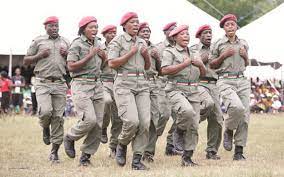The government’s reintroduction of the National Youth Service ahead of the 2023 general elections has been dismissed as a campaign strategy by the ruling Zanu-PF party.
The cabinet approved Tuesday the re-establishment of the controversial National Youth Service which was suspended in 2018.
Initially introduced in 2000 as a brainchild of the late former Youth Development, Gender and Employment Creation Minister Border Gezi is known for producing graduates known as the green bombers who terrorised villagers in the past elections coercing them to vote for Zanu-PF.
Announcing the return of the programme, Information Publicity and Broadcasting Services, Monica Mutsvangwa said it was designed to equip youths, who comprise persons between the ages of 18 and 35 years with patriotism, discipline, volunteerism, survival skills, hard work, loyalty, tolerance, resilience, determination and honesty.
“During training, the youths will be encouraged to participate in development projects and disaster response activities and thereby assist in enhancing national capacity to manage disasters,” she said.
Graduates of the programme, Mutsvangwa said, will qualify for further training, assistance in starting businesses, and enrolment for careers in the police, the army, the air force, nursing and teaching, among others.
The youths, Mutsvangwa added, will not pay fees but will be provided with uniforms, training kits and travel expenses and will be accorded allowances dependent on the availability of funds.
“The Zanu-PF government is doing all it can to retain power,” said a political analyst, Mkhululi Tshuma.
“The approaching 2023 elections are the reason why they are now reintroducing the national youth service so as to increase their chances of retaining political power in 2023. The party is now very unpopular since it has failed to deliver on all that it promised in its 2018 election manifesto and thus faces a heavy shellacking if it doesn’t do anything. The bringing in of the green bombers is now a means to rekindle its waning political base.”
Tshuma said the National Youth Service was not at all in the national interest.
“The national youth service is not in the best interest of Zimbabweans but Zanu-PF as a party,” he told CITE.
“People want jobs, proper health care and food and not this dose of more politics. However, Zanu-PF has proven beyond measure that they win elections so that they prepare for the next election and not to implement sound socio-economic policies. The return of the National Youth Service must be looked at in this light.”
He added that the programme would be a waste of the country’s resources.
“It will be a reckless burden on an already drained fiscus,” he decried.
“The economy will continue to buckle as more election-related burdens like the National Youth Service continue being loaded onto it. The country’s resources are being unnecessarily strained.”
Vusumuzi Chirwa, another political analyst said the green bombers were a vital campaign machine during the era of the late former president Robert Mugabe.
“It (National Youth Service) was used to unleash terror on the electorate, thus the reintroduction of the dreaded green bombers is likely to be for the very same purpose for which it was initially founded,” said Chirwa.
“With almost 100% unemployment, high levels of poverty being experienced, the National Youth Service is not in the best interest of Zimbabweans. If university graduates remain unemployed, they need employment, not national service. If millions of youths remain unemployed, they need national employment, not national service.”
He added that the programme would negatively impact on the country’s ailing economy.
“The government can’t do this program at the expense of taxpayers at a time when we need to fund the dead heath delivery system so that we are prepared for the third, fourth and fifth Covid-19 waves,” he said.
“Priority should also be on funding the social distance-compliant education system so that children can go to school on a daily basis in schools with pro-social distance infrastructure. Teachers and nurses are still demanding salary adjustments. Let’s prioritize that instead.”
Opposition Zapu spokesperson, Iphithule Maphosa also said the programme was being introduced to be used as a campaign tool by Zanu-PF.
“There is no other reason for the reintroduction except the 2023 elections,” said Maphosa.
“Zanu-PF, which has conflated party and government, is already preparing a paramilitary force to intimidate and cow people into voting for it, the same way the Border Gezi episode harassed and violated citizens. I can boldly warn that the next general election campaign will be violent and bloody.”
Maphosa also said the programme was not in the national interest.
“There is nothing ZANU-PF does that benefits the people,” he said.
“After having failed dismally to empower the youth, the ruling party has devised a way of distraction by way of further caging them in camps in the process diverting attention from its blatant failures. After indoctrination, the poor youth will be used as stormtroopers in a violent election campaign that will result in a ZANU-PF win. It’s all about what ZANU-PF has got to win or gain and never about the people.”
He added that the programme was another burden on the already depleted fiscus with a few corrupt officials from both the party and government getting yet another opportunity to milk the scarce national resources.
“Starvation will be the order of the day in those camps yet the funds will be released only to be stolen by ZANU PF,” he warned.

